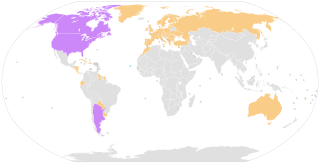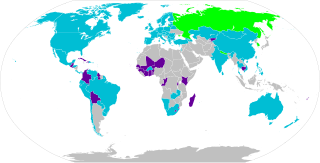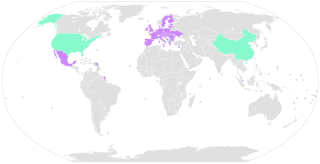
Tobias Michael Carel Asser was a Dutch lawyer and legal scholar.

The Hague Conventions of 1899 and 1907 are a series of international treaties and declarations negotiated at two international peace conferences at The Hague in the Netherlands. Along with the Geneva Conventions, the Hague Conventions were among the first formal statements of the laws of war and war crimes in the body of secular international law. A third conference was planned for 1914 and later rescheduled for 1915, but it did not take place because of the start of World War I.

The Convention of 5 October 1961 Abolishing the Requirement of Legalisation for Foreign Public Documents, also known as the Apostille Convention, is an international treaty drafted by the Hague Conference on Private International Law (HCCH). It is intended to simplify the procedure through which a document, issued in one of the contracting states, can be certified for legal purposes in all the other contracting states. A certification under the convention is called an apostille or Hague apostille. It is an international certification comparable to a notarisation, and may supplement a local notarisation of the document. If the convention applies between two countries, an apostille issued by the country of origin is sufficient to certify the document, and removes the need for further certification by the destination country.

The Hague Conference on Private International Law (HCCH) is an intergovernmental organisation in the area of private international law, that administers several international conventions, protocols and soft law instruments.

The Convention on the Service Abroad of Judicial and Extrajudicial Documents in Civil or Commercial Matters, more commonly called the Hague Service Convention, is a multilateral treaty that was adopted in The Hague, The Netherlands, on 15 November 1965 by member states of the Hague Conference on Private International Law. It came into existence to give litigants a reliable and efficient means of serving the documents on parties living, operating or based in another country. The provisions of the convention apply to service of process in civil and commercial matters but not criminal matters. Also, Article 1 states that the Convention shall not apply if the address of the person to be served with the document is not known.

The Hague Convention on the Law Applicable to Trusts and on their Recognition, or Hague Trust Convention is a multilateral treaty developed by the Hague Conference on Private International Law on the Law Applicable to Trusts. It concluded on 1 July 1985, entered into force 1 January 1992, and is as of September 2017 ratified by 14 countries. The Convention uses a harmonised definition of a trust, which is the subject of the convention, and sets Conflict rules for resolving problems in the choice of the applicable law. The key provisions of the Convention are:

The Hague Convention on parental responsibility and protection of children, or Hague Convention 1996, officially Convention of 19 October 1996 on Jurisdiction, Applicable Law, Recognition, Enforcement and Co-operation in respect of Parental Responsibility and Measures for the Protection of Children or Hague Convention 1996 is a convention of the Hague Conference on Private International Law. It covers civil measures of protection concerning children, ranging from orders concerning parental responsibility and contact to public measures of protection or care, and from matters of representation to the protection of children's property. It is therefore much broader in scope than two earlier conventions of the HCCH on the subject.

The Cape Town Convention on International Interests in Mobile Equipment, or Cape Town Treaty is an international treaty intended to standardize transactions involving movable property. The treaty creates international standards for registration of contracts of sale, security interests (liens), leases and conditional sales contracts, and various legal remedies for default in financing agreements, including repossession and the effect of particular states' bankruptcy laws.
The Convention on the Nationality of Married Women is an international convention passed by the United Nations General Assembly in 1957. It entered into force in 1958 and as of 2013 it has 74 state parties.

Trust law is not part of most civil law jurisdictions, but is a common figure in most common law system. Trust law enters civilian jurisdictions through conflict of law arrangements recognizing it as a matter of private international law and has been implemented in the civil code of certain countries such as Liechtenstein and Curaçao.

The Hague Convention on Protection of Children and Co-operation in Respect of Intercountry Adoption is an international convention dealing with international adoption, child laundering, and child trafficking in an effort to protect those involved from the corruption, abuses, and exploitation which sometimes accompanies international adoption. The Convention has been considered crucial because it provides a formal international and intergovernmental recognition of intercountry adoption to ensure that adoptions under the Convention will generally be recognized and given effect in other party countries.
International matrimonial law is an area of private international law. The area specifically deals with relations between spouses and former spouses on issues of marriage, divorce and child custody. In the last 50 years, the States Members of the Hague Conference on Private International Law have attempted to harmonize domestic matrimonial laws and judicial rulings across international borders in these areas.
Commonly referred to as the "Guardianship Convention", the Convention of 1902 relating to the settlement of guardianship of minors, along with the other Conventions in 1902, was the Hague Conference's first effort at addressing international family law. It was the first form of family law which would stay relevant for decades afterwards; it was also the only family law treaty that was expressly preserved and revived in the Treaty of Versailles and other post World War I peace treaties. The Guardianship Convention was written only in French and, with the Boll case, is the only Convention of the Hague Conference to ever be the principal subject of interpretation before a court with worldwide jurisdiction.
The Convention of 1961 Concerning the Powers of Authorities and the Law Applicable in Respect of the Protection of Infants, French: Convention du 5 octobre 1961 concernant la compétence des autorités et la loi applicable en matière de protection des mineurs, or Hague Protection of Minors Convention is a multilateral convention of the Hague Conference on Private International Law. The 1961 Convention emphasized the concept of the "interests of the child" as a basis for authorities of the child's nationality to overrule the authorities of the child's habitual residence. It built upon prior efforts to create successful multilateral treaties and brought an innovation in terminology by creating a compromise between advocates of "nationality" as the determining factor for jurisdiction and advocates for the modern fact-centric model of "habitual residence." The convention also included expanded language to encompass both judicial and administrative authorities in response to the Boll case. Of particularly special note, the drafters of the 1961 Convention expressly considered a provision addressing the removal of a child from their habitual residence with an intent to evade rightful jurisdiction—primarily for child custody reasons. This first attempt to codify international child abduction failed due to an inability to agree on a definition or manner of describing the phenomenon, with a number of countries that adhered to the principle of nationality regulating personal child and family law unable to classify their nationals removing children from foreign countries to their home state as illegal.
The Convention on the association of the Netherlands Antilles with the European Economic Community is an international agreement amending the Treaty establishing the European Economic Community, with the aim of awarding OCT status to the Netherlands Antilles, which was a constituent country of the Kingdom of the Netherlands from 1954 until 2010. A full treaty revision was needed because Belgium, France, Germany, Italy, and Luxembourg wanted to add a protocol on the import of refined petroleum products from the Netherlands Antilles.

The Hague Convention on the International Recovery of Child Support and Other Forms of Family Maintenance, also referred to as the Hague Maintenance Convention or the Hague Child Support Convention is a multilateral treaty governing the enforcement of judicial decisions regarding child support extraterritorially. It is one of a number of conventions in the area of private international law of the Hague Conference on Private International Law in 2007. The convention is open to all states as well as to Regional Economic Integration Organizations as long as they are composed of sovereign states only and have sovereignty in the content of the convention. The convention entered into force on 1 January 2013 between Norway and Albania, with Bosnia-Herzegovina (2013), Ukraine (2013), the European Union, Montenegro (2017), United States (2017), Turkey (2017), Kazakhstan (2017), Brazil (2017), Honduras (2017), Belarus (2018), Guyana (2020), Nicaragua (2020), United Kingdom (2021), Serbia (2021), New Zealand (2021) and Ecuador (2022) following suit. Because the EU acceptance of the convention applies in 26 EU countries, the convention applies in 43 countries worldwide.

The Hague Divorce Convention, officially Convention on the Recognition of Divorces and Legal Separations is a convention concluded by the Hague Conference on Private International Law (HCCH). It regulates the recognition of divorces and legal separations provided they have been performed according to the correct legal process in the state where the divorce was obtained. Not all divorces need to be recognized under the convention. Only those divorces obtained in a state where ;

The Hague choice of court convention, formally the Convention of 30 June 2005 on Choice of Court Agreements, is an international treaty concluded within the Hague Conference on Private International Law. It was concluded in 2005, and entered into force on 1 October 2015. The European Union, Denmark, Mexico, Singapore and the United Kingdom are parties to the convention. China, Israel, North Macedonia, Ukraine and the United States signed the convention, but did not ratify.

The Hague Judgments Convention, formally the Convention of 2 July 2019 on the Recognition and Enforcement of Foreign Judgments in Civil or Commercial Matters is an international treaty concluded within the Hague Conference on Private International Law. It was concluded in 2019, and has not entered into force. The convention governs the recognition of judgements in civil and commercial matters.













